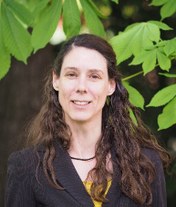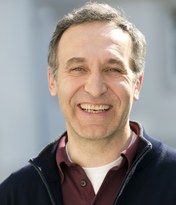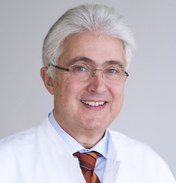Seven influential voices
Freiburg, Nov 20, 2019
An extensive list of publications is a good business card in academic circles. If a publication is also widely read and frequently quoted, its author has a chance of a place in a ranking of a special kind: “Highly Cited Researchers,” a database based on the Web of Science that determines which scientists are cited the most worldwide and thus have the greatest influence on research in their field. Hans-Dieter Fronz summarizes the work of the seven Freiburg researchers who are represented on the ranking list.

Alexandra-Maria Klein, Department Head Chair of Nature Conservation and Landscape Ecology, investigates how bee pollination or the natural control of insect populations affects ecosystem functions. Klein's work focuses on understanding the effects of environmental factors on macroorganisms and developing measures to improve biodiversity, including the protection of beneficial insects in agricultural landscapes, urban areas and forests. In addition, she is developing transdisciplinary and holistic concepts for nature conservation.
Photo: Felix Fornoff
 Jürgen Bauhus, who was named Professor of Silviculture in 2003, was Dean of the Faculty of Forest and Environmental Sciences and is now spokesperson for the Institute of Forest Sciences. Together with his team, Bauhus investigates the development dynamics of forests, carbon and nutrient cycles as well as the function of tree species diversity. The effects of the structure and composition of forests on the manifold functions of this habitat is a central topic of his research, including the ways in which forest use influences biodiversity. Bauhus is currently investigating how forests can become more resistant to climate change with suitable tree species and their mixtures and with the help of silvicultural measures.
Jürgen Bauhus, who was named Professor of Silviculture in 2003, was Dean of the Faculty of Forest and Environmental Sciences and is now spokesperson for the Institute of Forest Sciences. Together with his team, Bauhus investigates the development dynamics of forests, carbon and nutrient cycles as well as the function of tree species diversity. The effects of the structure and composition of forests on the manifold functions of this habitat is a central topic of his research, including the ways in which forest use influences biodiversity. Bauhus is currently investigating how forests can become more resistant to climate change with suitable tree species and their mixtures and with the help of silvicultural measures.
Photo: Jürgen Gocke
 Prof. Dr. Carsten Dormann deals with topics as diverse as the consequences of climate change for biodiversity or scientific credibility. The biologist has headed the Department of Biometry and Environmental System Analysis at the Institute of Earth and Environmental Sciences since 2011. His research focuses on method comparison and critical questioning as well as the refinement of statistical ecology instruments. Analogous to evidence-based medicine, he has a strong commitment to research transparency and the evidence of its results.
Prof. Dr. Carsten Dormann deals with topics as diverse as the consequences of climate change for biodiversity or scientific credibility. The biologist has headed the Department of Biometry and Environmental System Analysis at the Institute of Earth and Environmental Sciences since 2011. His research focuses on method comparison and critical questioning as well as the refinement of statistical ecology instruments. Analogous to evidence-based medicine, he has a strong commitment to research transparency and the evidence of its results.
Photo: Roger Kupfer
 Evidence-based health care means the systematic use of scientific data for individual and population-based health-related decisions. Jörg Meerpohl is professor at the Institute for Evidence in Medicine, located in the Faculty of Medicine. As director of the institute, he also heads the Freiburg GRADE Center and the Cochrane Deutschland Foundation. Meerpohl works in the field of critical evaluation and interpretation of evidence, mostly according to the GRADE methodology. His work focuses on different types of evidence synthesis, the methodology of guideline development and research on research integrity.
Evidence-based health care means the systematic use of scientific data for individual and population-based health-related decisions. Jörg Meerpohl is professor at the Institute for Evidence in Medicine, located in the Faculty of Medicine. As director of the institute, he also heads the Freiburg GRADE Center and the Cochrane Deutschland Foundation. Meerpohl works in the field of critical evaluation and interpretation of evidence, mostly according to the GRADE methodology. His work focuses on different types of evidence synthesis, the methodology of guideline development and research on research integrity.
Photo: University Medical Center Freiburg
 The immunologist Edward Pearce, who taught at US universities for many years, has been Professor of Immunobiology at the Institute of Biology III at the University of Freiburg since 2015. In the same year, he became senior group leader at the Max Planck Institute of Immunobiology and Epigenetics. The British scientist is investigating inflammation and immunity to parasitic infections and cancer. Another focus of his work is the investigation of the importance of dynamic metabolic changes in the activation of immune cells.
The immunologist Edward Pearce, who taught at US universities for many years, has been Professor of Immunobiology at the Institute of Biology III at the University of Freiburg since 2015. In the same year, he became senior group leader at the Max Planck Institute of Immunobiology and Epigenetics. The British scientist is investigating inflammation and immunity to parasitic infections and cancer. Another focus of his work is the investigation of the importance of dynamic metabolic changes in the activation of immune cells.
Photo: ADA/Matt Herp
 Marco Prinz has been Medical Director of the Institute of Neuropathology at the University Hospital of Freiburg since 2008. In 2015, he received one of the coveted Reinhart-Koselleck projects by the German Research Foundation. His research focuses on neuroimmunology, neurodegeneration and innate immunity. Prinz is particularly interested in the function of microglial cells in the brain, which ensure that the organ develops in a healthy way. Prinz has shown that their failure has a negative effect on the course of Alzheimer’s disease or multiple sclerosis. More recently, he has been investigating how these cells interact with the intestinal flora. Prinz has been awarded multiple accolades for his work.
Marco Prinz has been Medical Director of the Institute of Neuropathology at the University Hospital of Freiburg since 2008. In 2015, he received one of the coveted Reinhart-Koselleck projects by the German Research Foundation. His research focuses on neuroimmunology, neurodegeneration and innate immunity. Prinz is particularly interested in the function of microglial cells in the brain, which ensure that the organ develops in a healthy way. Prinz has shown that their failure has a negative effect on the course of Alzheimer’s disease or multiple sclerosis. More recently, he has been investigating how these cells interact with the intestinal flora. Prinz has been awarded multiple accolades for his work.
Photo: University Medical Center Freiburg
 After working in Heidelberg and Munich, Franz-Josef Neumann joined the University Heart Center Freiburg - Bad Krozingen as Medical Director in 2001. He has been Medical Director of the Clinic for Cardiology and Angiology II there for seven years. His current research focuses on interventional cardiology. His research group has carried out important research on the customization of anticoagulant therapy after catheter intervention. More recently, personalized medicine, especially in the field of catheter technology and antithrombotic therapy, has also been a major focus of his work. Neumann’s research results have found their way into international treatment guidelines.
After working in Heidelberg and Munich, Franz-Josef Neumann joined the University Heart Center Freiburg - Bad Krozingen as Medical Director in 2001. He has been Medical Director of the Clinic for Cardiology and Angiology II there for seven years. His current research focuses on interventional cardiology. His research group has carried out important research on the customization of anticoagulant therapy after catheter intervention. More recently, personalized medicine, especially in the field of catheter technology and antithrombotic therapy, has also been a major focus of his work. Neumann’s research results have found their way into international treatment guidelines.
Photo: University Medical Center Freiburg
Ranking “Highly Cited Researchers”

